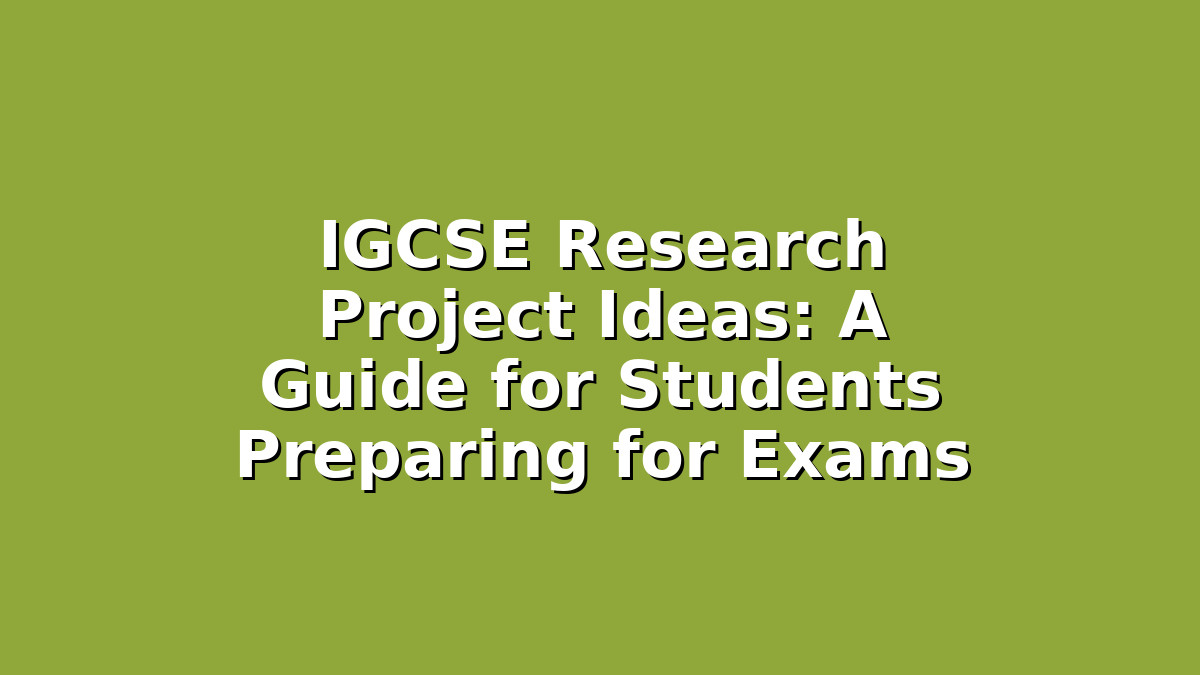Preparing for your IGCSE exams can feel overwhelming, especially when you’re assigned a research project that requires creativity, critical thinking, and in-depth study. Choosing the right topic is crucial not only for your grades but also for keeping your motivation high throughout the research process. If you’re looking for inspiring IGCSE research project ideas and study tips to help you succeed, you’ve come to the right place. In this article, we’ll walk you through a variety of engaging project ideas across different subjects and share effective strategies to make your research project a rewarding experience.
Understanding the Importance of Your IGCSE Research Project
Before diving into project ideas, it’s important to understand why the research project plays such a significant role in your IGCSE studies. This project allows you to apply what you’ve learned in a practical context, develop critical research skills, and improve your ability to communicate complex information clearly. It is also an opportunity to explore a topic that interests you personally, which can make studying for your exams more enjoyable.
Approaching your research project with the right mindset and tools will not only boost your confidence but also sharpen skills that benefit you beyond your exams—like problem-solving, data analysis, and time management.
Section 1: Choosing the Right IGCSE Research Project Idea
Selecting a suitable topic is often the most challenging part of your research project. To help with this, consider the following tips:
1. Align Your Topic with Your Interests and Strengths
Think about the subjects you enjoy the most or areas you’d like to explore further. For example, if you have a passion for science, you might choose a project about renewable energy sources or the impact of plastic pollution on marine life. If you prefer humanities, topics like historical events or cultural studies can be fulfilling.
2. Choose Topics with Available Resources
Make sure there is enough information available for you to conduct thorough research. Check textbooks, online databases, and libraries early on to confirm you can find credible sources to support your project.
3. Consider the Scope and Time Frame
Your project should be manageable within the time you have before your exams. Avoid topics that are too broad or too narrow. For instance, instead of tackling “Climate Change,” narrow it down to “The Effects of Climate Change on Coastal Cities.”
Popular IGCSE Research Project Ideas by Subject:
– Science: The effect of different fertilizers on plant growth, investigating water quality in your local area, or studying the human impact on local wildlife.
– History: The causes and effects of a significant historical event, such as World War II, or a study of colonial history in a specific region.
– Geography: The impact of tourism on a particular environment, urban growth and its challenges, or natural disaster preparedness.
– Literature: Analyzing themes in a novel you’ve studied or comparing the portrayal of women in two different literary works.
– Business Studies: A case study on the marketing strategy of a popular brand or the effects of e-commerce on traditional retail.
Section 2: Effective Research and Study Techniques for Your Project
Once you’ve chosen your topic, the next step is to gather and organize your information efficiently. Here are some practical tips to make this stage productive:
1. Create a Research Plan
Break your project into smaller tasks and set deadlines for each. For example, allocate time for initial research, data collection, analysis, and writing. Using planners or digital tools like Trello or Google Keep can help you stay on track.
2. Use Multiple Sources
Don’t rely on just one book or website. Use a mix of textbooks, academic journals, reputable websites, interviews, and even documentaries. Evaluating information critically is vital to ensure your sources are reliable.
3. Take Organized Notes
Develop a systematic way to take notes, such as summarizing key points, highlighting important quotes, and recording source details. This will make writing your project easier and help you avoid plagiarism.
4. Practice Critical Thinking
Ask yourself questions as you research: Why is this information important? How does it relate to my topic? Are there alternative viewpoints? This approach deepens your understanding and enriches your project.
Section 3: Writing and Presenting Your IGCSE Research Project
After gathering your research, the next challenge is to present your findings clearly and confidently.
1. Structure Your Project Properly
A well-organized project typically includes:
– Introduction: Outline your topic, objectives, and why it’s important.
– Methodology: Explain how you conducted your research.
– Findings and Analysis: Present your data and interpret it.
– Conclusion: Summarize your key points and reflect on your research.
– References: List your sources in the correct format.
Using headings and subheadings helps readers follow your argument easily.
2. Write Clearly and Concisely
Avoid overly complex language. Aim for clarity and simplicity. Make your points directly and support them with evidence from your research.
3. Edit and Proofread
After finishing your draft, set it aside for a day or two before reviewing. Check for grammatical errors, awkward phrasing, and factual accuracy. You can also ask a teacher, friend, or family member to provide feedback.
4. Practice Your Presentation Skills
If your project requires an oral presentation, rehearse multiple times. Use visual aids such as slides or posters to enhance your explanation. Speak slowly, maintain eye contact (if possible), and prepare to answer questions confidently.
Conclusion
Your IGCSE research project is a valuable opportunity to explore a topic you care about, develop essential academic skills, and prepare effectively for your exams. By choosing the right topic, managing your research thoughtfully, and presenting your findings clearly, you can transform this assignment into a rewarding experience that boosts both your knowledge and confidence. Remember, persistence and organization are your best allies. Stay curious, stay motivated, and don’t hesitate to seek guidance when needed. With the right approach, your IGCSE research project can be a stepping stone toward academic success and beyond.
Good luck with your studies—you’ve got this!

Responses